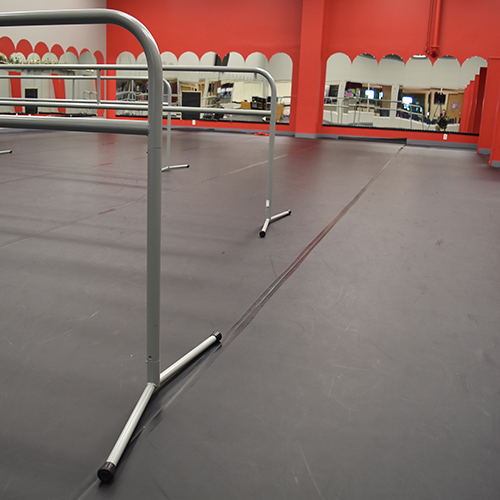Do You Need Floor Polish For A Dance Studio?
Related Product: Rosco Heavy Duty Floor Cleaner 1 Gallon
Should You Use Floor Polish in Your Dance Studio?
In most cases, no, you shouldn’t use floor polish in your dance studio, but that answer partially depends on the materials used in your dance floors.If you have floors made of hardwood, you will need to care for those floors by sweeping them and mopping them with a non-oil-based detergent. You should also lightly apply a dance floor wax each month, which will help to maintain the floor’s finish and shine.
But if you’re using vinyl Marley dance floors, you should NEVER use polish on those floors.
Instead, only use an approved product like the Rosco Heavy Duty Floor Cleaner.

This floor cleaner is suitable for daily cleaning needs, and you can dilute it with warm water for those standard cleanings. If you need to remove tap marks and tape residue, you can use the cleaner full-strength.
The cleaner will not make the floor slippery, an important factor in your dancers’ safety. If you need to disinfect your Marley floors, you can use a solution of one ounce of vinegar to one gallon of cold water.
Practices That Can Damage Your Dance Floors
Before you clean or add a finish to your dance floors, it’s important to check the instructions provided by the floor product’s manufacturer. Different dance floor products have varying cleaning and maintenance requirements, and products that are suitable on one type of material aren’t necessarily suitable on another material.Regardless of the type of flooring material that you’re using, there are some practices that will almost certainly damage your dance floor.
Excessive Wet Mopping
The first is excessively wet mopping the floor. While wet mopping can be a helpful tool in thoroughly cleaning your floors, it’s best to only use a wet mop every two to three days, and even less frequently if possible.
Too much wet mopping can affect the flexibility and the aesthetics of your floors. Wet mop the floors based on the amount of use they see, rather than putting them on a daily or standard mopping schedule.
Harsh Cleaners
It’s also essential to avoid using bleach on your dance floors. Not only can bleach affect the look and color of your floors, but repeated use will wear away at the floor’s surface.
Common cleaning products like ammonia, alcohol, and acetone can also cause Marley dance floors to become brittle. The floors will eventually lose their flexibility, and you should never use these products to clean your dance floors.
Similarly, it’s important to avoid using any cleaning products that are oil-based. These can leave an oily finish on the floors, potentially causing dancers to slip.
Best Practices in Caring for Your Dance Floors
To best care for your dance floors, develop a daily routine whenever your studio is in use. After the studio closes for the night, sweep and dry mop your floors.Simple Cleaning Maintenance
As you sweep, stop and pick up any large pieces of dirt or crumbs, so you don’t drag those materials around the floor. Follow up with a microfiber cloth to remove any dirt that the broom has missed.
This maintenance can help to keep your floors free of dirt and oil buildup, meaning the floors will require fewer deep cleanings, which helps to preserve their lifespan.
Manage Scuffs
Every dance floor will develop scuffs from time to time, and you can often use a non-abrasive cloth or even a tennis ball to simply rub out those scuffs. You may also be able to dilute some floor cleaner to help remove the scuffs.
Proper Installation and Storage
If your dance floors are temporarily installed, then be sure to follow the manufacturer’s instructions for installing, removing, and storing those products. Where and how you store your flooring products can affect them, too.
For example, many Marley products need to be rolled and then stored vertically, rather than laid down. Laying the products down can cause them to develop deformities because of the pressure from the roll’s weight, and you won’t achieve that same clean, smooth look when you go to install the product again.

Structuring your storage space so that none of the Marley touches the floor when it’s stored is the best option. It’s also helpful to cover any of your flooring products while they’re in storage, which can help to prevent dirt from accumulating on the flooring.
With proper installation, cleaning, and maintenance, you shouldn’t have to polish your dance floors (with the exception of periodically waxing a hardwood floor). Focusing on regular and thorough cleaning can help to keep your floors looking their best, maximizing your investment and delivering an optimal floor performance for your dancers.


